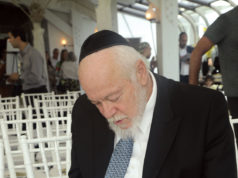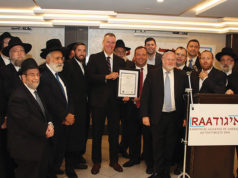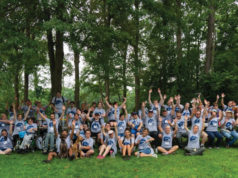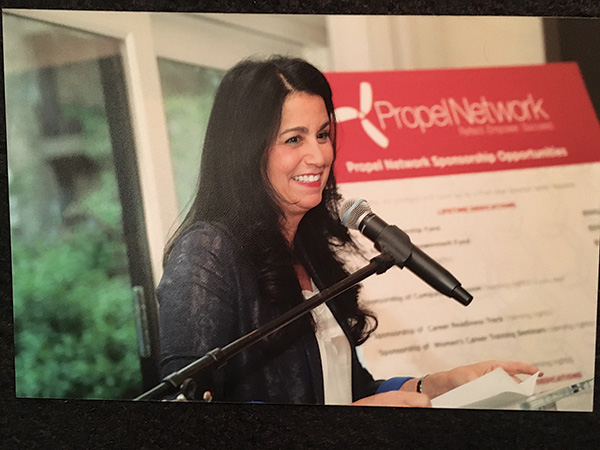
REBECCA HARARY IS WELL KNOWN IN THE JEWISH COMMUNITY AS AN ACTIVIST, A MOVER AND SHAKER; SOMEONE WHO GETS THINGS DONE. SHE IS A NATURAL LEADER, WELL SPOKEN, PERSONABLE, EASY TO GET ALONG WITH, AND ALWAYS LOOKS ON THE POSITIVE SIDE. HER DEMEANOR MAKES YOU WANT TO HUG HER, TO SHARE YOUR WORRIES, TO BE HER FRIEND. SHE MAKES THOSE AROUND HER WHO ARE STRESSED FEEL RELAXED.
Over the past few decades, Rebecca’s volunteer contributions to the community have been unrelenting and the results have helped countless families in ways we cannot imagine. Children with learning disabilities and challenges educated in two different community schools, marriages stabilized, and hundreds of thousands of dollars saved in education and tuition assistance costs. From the formation of Imagine Academy, Gesher Yehuda’s Yeshiva Prep High School, and Propel Network, Rebecca had the idea, the stamina and the determination to make each dream become a reality.
And it didn’t stop there. She had her own event planning business, raised six accomplished children and ran for elected office, all with her supportive husband Joe Harary at her side. Her mother Joyce Salame has always been her role model; a woman who went to work to help her own family.
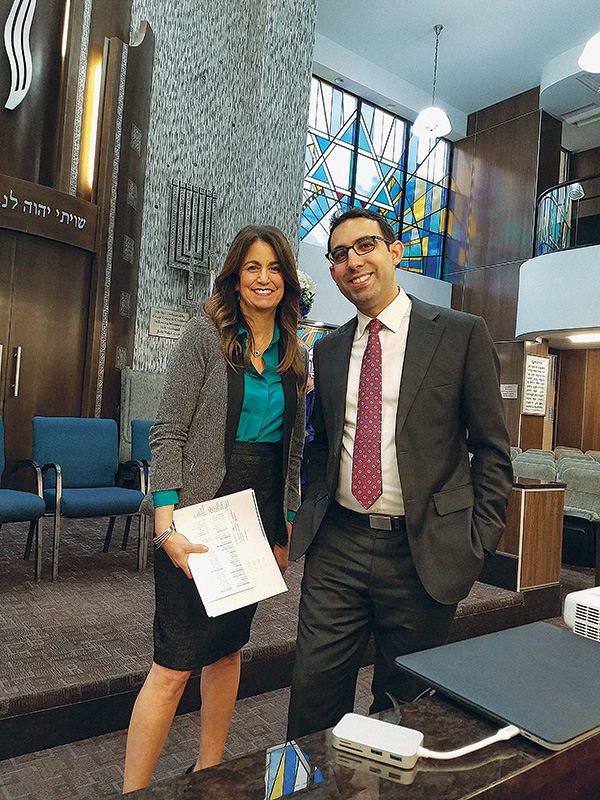
“I like to look for things that need to happen—voids— and I like to fill them,” said Rebecca in an interview. “My mother put her shoulder to the wheel, so to speak, to help our family, and I learned from her.” Rebecca serves on at least four boards of directors.
The oldest of eight children growing up in Fort Lauderdale, Rebecca Salame Harary helped her mother, Joyce (Hanan) Salame raise the younger siblings, as her father, Robert Salame A”H, worked in retail. Her father was an excellent businessman, and he taught Rebecca a lot about the art of selling, and how to form trusting relationships with clients. Her mother is a take charge woman who, among many other things, took an H&R Block class in tax prep to help her family financially. A year later, Joyce was running several H&R Block offices on the East Coast of Florida. When the family moved to Brooklyn in 1981, Joyce had the family’s eighth child, and then eventually went back to school. She earned a teaching degree as well as two masters’ degrees in administration and became a full-time English teacher and then assistant principal at Yeshivah of Flatbush for 25 years.
After being married a decade and having four children, Rebecca returned to school and graduated FIT with a degree in Display and Exhibit Design. She then started her own successful event planning business—Rebecca Designs. She later applied the business lessons learned from running Rebecca Designs with 30 full time employees to community issues. After shuttering the business in 2000, when she was expecting her sixth child, she eventually became President of the Ladies Auxiliary at Yeshivah of Flatbush, raising a record $300,000 in 2003, and taught at FIT as an Adjunct Professor in the Display and Exhibit Design Department.
Rebecca’s cousin has a child with autism and was going through a difficult time. Rebecca learned there were several other community families in the same situation, each with a child in a different school, with one paying as much as $100,000 a year for their child, with no insurance, and no Jewish education attached.
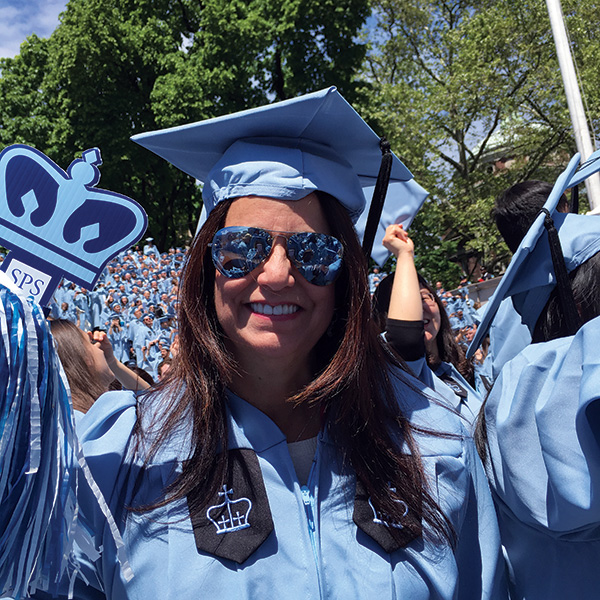
Having a child with a disability was hush-hush, a stigma, and families were afraid to be public about it. A support group of several families were meeting monthly, and Rebecca visited the group. She listened to them and suggested they start their own school for autism for community families. After forming a board of directors with four other community couples, a summer fundraiser raised over $1 million. Imagine Academy for Autism opened by September, 2004 in Brooklyn with 10 children and a waiting list of 30 more. Teaching the children in a Jewish environment, the school has become a national model for educating children on the autism spectrum, merging two popular schools of thought about educating children with autism into one school. Today, the school has more than 70 children enrolled. The building where the school is located in Brooklyn was a former condo building, and two apartments were left to teach the children life skills.
As if that wasn’t enough, Rebecca observed that there were many children in the community going into high school with milder learning challenges who were not succeeding in the typical yeshivah classroom. These children needed more support than the yeshivot could provide. Gesher Yehuda Elementary School, which was founded in 1993 by Jack and Claudie Setton to help children with mild learning challenges, with the goal of having the students return to the regular education setting, was the perfect lead to form a new community high school.
Together with Jack Setton, Rebecca founded Yeshiva Prep High School for students who needed additional academic support. The school opened in 2005 to help those students aging out of the K to 8 schools who were not yet ready to attend a high school. An agreement with Yeshivah of Flatbush High School allows Yeshiva Prep students to participate in non-academic and social activities such as morning prayers, Shabbatons, plays, gym, computer classes and more. It is mutually beneficial for Yeshivah of Flatbush, as the yeshivah may send a child to Yeshiva Prep High School for support in a particular subject.
Feeling she wanted to learn more about nonprofit management, Rebecca sought and earned a Master’s Degree from Columbia University in Nonprofit and Business Management in 2016; a degree she felt she needed when she took on the role as the founding Executive Director of the Moise Safra Community Center in Manhattan in 2012. The idea for the community center germinated while Rebecca worked as Director of Programming under Rabbi Dr. Elie Abadie at the Edmond J. Safra Synagogue in 2010. As the Upper East Side community grew with more and more Sephardic families, they needed a school and community center of their own.
As the economic crisis grew, and yeshivah tuition rose, many community families could no longer rely on one income. The number of families on tuition assistance rose, according to Project Education, to nearly 50%. It was an unsustainable situation. Women needed to contribute to their household income.
After Rebecca received hundreds of calls from women who desperately needed to work but had no career training or computer skills, she realized the community needed a place for women to gain training and marketable skills. These women needed jobs, to earn money, and the ability to contribute to the household. No one was helping them. Many women didn’t even know how to write up a resumé. Seeing the need, Rebecca wrote a business plan, and together with Ezra S. Ashkenazi, she found a space, and identified major donors to launch PROPEL Network in 2015.
The board Rebecca recruited asked her to be its first Executive Director. She hired life coaches and other professionals. Today, with co-Executive Directors Alissa Shams and Randi Eisenstein, the organization gives computer classes, coaching, resume writing, office skills and many other types of skills training. Propel Network pays for women to receive training in marketable careers such as nursing, graphic design, culinary arts, teaching, and a variety of skills. The organization helps our community women in every way possible while they are in school and receiving their certification and degrees in their chosen career paths.
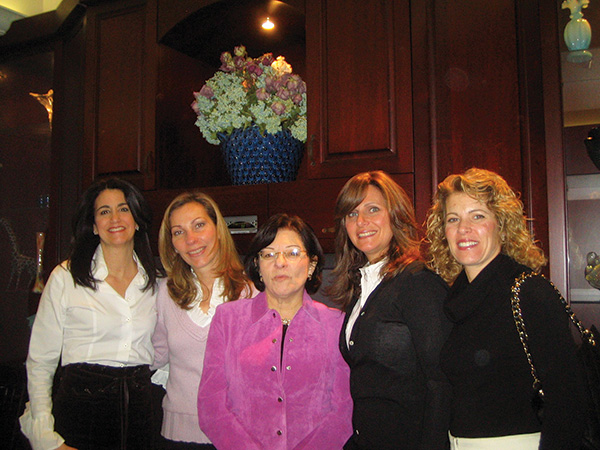
By being independent and able to earn an income, many of these families have been able to reduce or even eliminate the dependency on other community charities, such as the Sephardic Food Fund, Sephardic Bikur Holim, and yeshivah tuition assistance. Financial issues can have a huge impact and place enormous stress on marriages, and the additional income has helped to save many. Women who have become PROPEL Network clients have seen their self-esteem restored as they become self-reliant and able to proudly contribute financially to their household budgets.
“We wanted to give these women meaningful and practical careers so their families were not entirely dependent on one income,” said Rebecca. “Raising children is a critical and important job of course, and we can do other constructive things as well. The culture in the community has changed and PROPEL has helped that cultural shift away from a man-centered society. Today, women can pull their weight and share in meeting the financial demands of the family.”
By helping to train women to enter the workforce, PROPEL has helped women bring in almost $10 million of fresh revenue into the community. More than 700 community women have already received training, and are excelling in their new careers, while never taking their eyes off of their children and families.
Rebecca is certainly a woman to admire as she goes from one project to another. She attributes much of her success to her husband Joseph Harary, an attorney and CEO of a publicly traded company. “My husband has been supportive every step of the way and I could not have accomplished anything without him.”
The couple met in the Deal Casino. Joe was raised in West Palm Beach. Being raised with Ashkenazic friends and neighbors, they both understood the importance of higher education. “In Florida, our parent’s friends were all doctors and lawyers,” she said. “Education was first and foremost in ensuring a solid future.”
They have also been active politically. Rebecca ran for office in New York City twice and recently formed a non-partisan pollical action committee named CASEPAC (Combat Anti-Semitism Everywhere) to fight anti-Semitism in America, and help federal candidates, who want to support legislation that will fight Jew hatred, get elected to office. She is also concerned about security issues in our own community as anti-Semitism rises.
Joe and Rebecca have passed on their values to their six children, all of whom are college graduates with careers as a teacher, a chef, a pediatric nurse practitioner, a guidance counselor, business men and women. “They understand that there is joy in working in a meaningful career. They also understand that working enables us to enjoy the fun things in life,” said Rebecca.
Rebecca is not only a volunteer; she is committed to solving problems and helping those around her in any way she can.
Maimonides listed eight levels of tzedakah (acts of loving kindness) in the Mishneh Torah. The most important level is one where the recipient can be self-reliant. It is often referred to with the phrase “Give a man a fish and you feed him for a day; Teach a man to fish and you will feed him for a lifetime.” Rebecca has fulfilled this level of tzedakah multiple times.
A genealogist and historian, Sarina Roffé is the author of Branching Out from Sepharad (Sephardic Heritage Project, 2017), Backyard Kitchen: The Main Course, Backyard Kitchen: Mediterranean Salads, and the cooking app, Sarina’s Sephardic Cuisine. Editor of awardwinning journal Dorot for the JGS of NY, Sarina holds a BA in Journalism, and MA in Jewish Studies and an MBA. She is President of the Sephardic Heritage Project, Co-Chair of the Brooklyn Jewish
Historical Initiative and Chair of the Sephardic Research Division of JewishGen.
SARINA ROFFÉ

